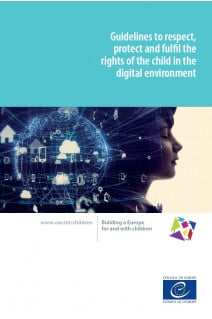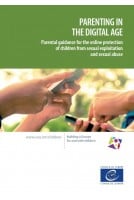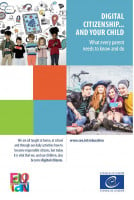Children need special protection online and they need to be educated about how to steer clear of danger and how to get maximum benefit from their use of the Internet. To achieve this, children need to become digital citizens.
The guidelines to respect, protect and fulfil the rights of the child in the digital environment were adopted by the Committee of Ministers of the Council of Europe on 4 July 2018. This publication contains the recommendations, addressed to all member states of the Council of Europe, followed by useful, thematically directed sections to guide states on fundamental principles and rights, operational principles and measures to respect, protect and fulfil the rights of the child in the digital environment, national frameworks and international co-operation and co-ordination.
The purpose of the guidelines is to assist states and other relevant stakeholders in their efforts to adopt a comprehensive, strategic approach in building and containing the often complex world of the digital environment. Ensuring children’s interaction and safety in this environment is paramount. Among the many topics covered are the protection of personal data, provision of child-friendly content adapted to their evolving capacities, helplines and hotlines, vulnerability and resilience, as well as the role and
responsibilities of business enterprises. In addition, the guidelines call upon states to engage with children, including in decision-making processes, to ensure that national policies adequately address developments in the digital environment.
These guidelines are of interest to a very wide audience, ranging from national authority bodies, professionals, civil society, business and industry sectors, to families and children themselves.
FOREWORD RECOMMENDATION CM/REC(2018)7 OF THE COMMITTEE OF MINISTERS TO MEMBER STATES ON GUIDELINES TO RESPECT, PROTECT AND FULFIL THE RIGHTS OF THE CHILD IN THE DIGITAL ENVIRONMENT PREAMBLE GUIDELINES TO RESPECT, PROTECT AND FULFIL THE RIGHTS OF THE CHILD IN THE DIGITAL ENVIRONMENT 1. PURPOSE AND SCOPE 2. FUNDAMENTAL PRINCIPLES AND RIGHTS
2.1. Best interests of the child
2.2. Evolving capacities of the child
2.3. Right to non-discrimination
2.4. Right to be heard
2.5. Duty to engage other stakeholders
3. OPERATIONAL PRINCIPLES AND MEASURES TO RESPECT, PROTECT AND FULFIL THE RIGHTS OF THE CHILD IN THE DIGITAL ENVIRONMENT
3.1. Access to the digital environment
3.2. Right to freedom of expression and information
3.3. Participation, right to engage in play and right to assembly and association
3.4. Privacy and data protection
3.5. Right to education
3.6. The right to protection and safety
3.7. Remedies
4. NATIONAL FRAMEWORKS
4.1. Legal framework
4.2. Policy and institutional frameworks
4.3. Co-operation and co-ordination at national level
5. INTERNATIONAL CO-OPERATION AND CO-ORDINATION







